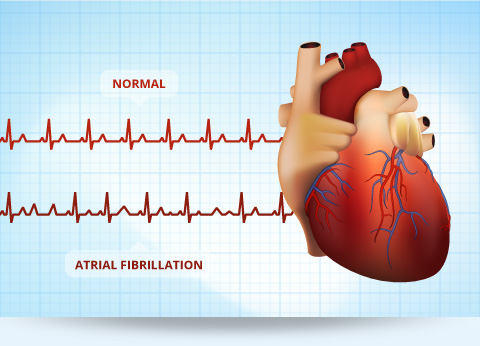- Home
- Editorial
- News
- Practice Guidelines
- Anesthesiology Guidelines
- Cancer Guidelines
- Cardiac Sciences Guidelines
- Critical Care Guidelines
- Dentistry Guidelines
- Dermatology Guidelines
- Diabetes and Endo Guidelines
- Diagnostics Guidelines
- ENT Guidelines
- Featured Practice Guidelines
- Gastroenterology Guidelines
- Geriatrics Guidelines
- Medicine Guidelines
- Nephrology Guidelines
- Neurosciences Guidelines
- Obs and Gynae Guidelines
- Ophthalmology Guidelines
- Orthopaedics Guidelines
- Paediatrics Guidelines
- Psychiatry Guidelines
- Pulmonology Guidelines
- Radiology Guidelines
- Surgery Guidelines
- Urology Guidelines
Amiodarone increases risk of falls and fainting in elderly, finds study

Amiodarone is associated with a higher risk of fall-related injuries and fainting in elderly, finds new study.
Researchers in Denmark designed a study to learn more about the potential risk for falls and fainting among older adults taking medication for atrial fibrillation. Their study has been published in the Journal of the American Geriatrics Society.
In elderly, fainting and falls are serious health concerns as they can lead to injury, hospitalization, and other severe consequences. The most common causes of fall include having certain chronic conditions, as well as taking certain medications that can raise risk of falls and fall-related injuries.
Atrial fibrillation is one medical condition that contributes to fainting and falls. Atrial fibrillation may be continuous or occasional and is the most common irregular heart rhythm in older adults. It occurs in three to five percent of people over age 65.
It is not only Atrial fibrillation but the medications to control it can potentially raise the risk for falls and fainting, though the connection hasn't studied significantly in the past.
Using Danish health data, the researchers identified patients who were between the ages of 65 and 100 when they were first diagnosed with atrial fibrillation. The researchers examined the records of 100,935 atrial fibrillation patients 65 years or older who filled prescriptions for heart rhythm medications.
The researchers examined the medication the patients took to control their heart rhythms. Prescriptions were for beta-blockers, certain calcium channel blockers (diltiazem, verapamil), and digoxin. Other medications included amiodarone, flecainide, and propafenone.
Then the researchers looked for those patients who had emergency department visits or hospital admissions for fainting, fall-related injuries, or both. Fall-related injuries were defined as fractures of the thigh, elbow, forearm, wrist, shoulder or upper arm, pelvis, and skull, as well as major and minor head injuries.
The researchers followed the patients for about two and a half years. During the follow-up period:
- 17,132 (17 percent) had a fall-related injury
- 5,745 (5.7 percent) had a fainting episode
- 21,093 (20.9 percent) had either a fall-related or fainting-related injury
There were 40,447 deaths without a fall-related injury or fainting episode, which accounted for 40.1 percent of study participants.
The researchers reported that the medication amiodarone was significantly associated with increased risk, whether it was prescribed alone or with other heart rhythm drugs. The medication digoxin was slightly associated with fall-related injuries.
The researchers also learned that people were at higher risk for an injury within the first 90 days of treatment, and especially within the first 14 days of treatment.
"Our findings add evidence that, for older patients with atrial fibrillation, treatment with amiodarone is associated with a higher risk of fall-related injuries and fainting," said the researchers. Additionally, the amiodarone connection was strongest within the first two weeks of the treatment but still present after long-term treatment.
The researchers concluded that being informed on the adverse risks of a given treatment is crucial to make shared decisions and provide quality patient care.
Next Story
NO DATA FOUND

Disclaimer: This site is primarily intended for healthcare professionals. Any content/information on this website does not replace the advice of medical and/or health professionals and should not be construed as medical/diagnostic advice/endorsement or prescription. Use of this site is subject to our terms of use, privacy policy, advertisement policy. © 2020 Minerva Medical Treatment Pvt Ltd